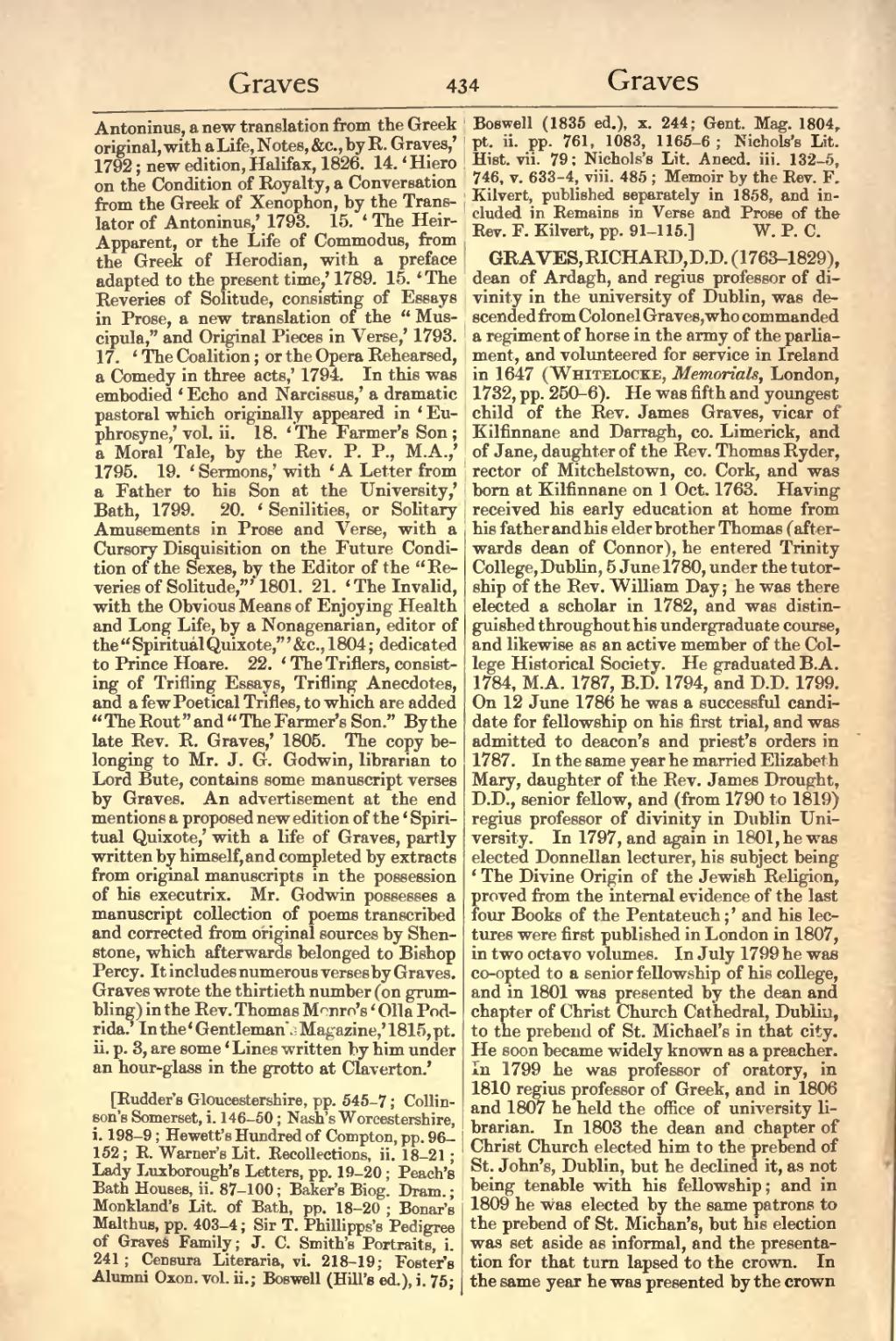Antoninus, a new translation from the Greek original, with a Life, Notes, &c., by R. Graves,’ 1792; new edition, Halifax, 1826. 14. ‘Hiero on the Condition of Royalty, a Conversation from the Greek of Xenophon, by the Translator of Antoninus,’ 1793. 15. ‘The Heir-Apparent, or the Life of Commodus, from the Greek of Herodian, with a preface adapted to the present time,’ 1789. 15. ‘The Reveries of Solitude, consisting of Essays in Prose, a new translation of the “Muscipula,” and Original Pieces in Verse,’ 1793. 17. ‘The Coalition; or the Opera Rehearsed, a Comedy in three acts,’ 1794. In this was embodied ‘Echo and Narcissus,’ a dramatic pastoral which originally appeared in ‘Euphrosyne,’ vol. ii. 18. ‘The Farmer's Son; a Moral Tale, by the Rev. P. P., M.A.,’ 1795. 19. ‘Sermons,’ with ‘A Letter from a Father to his Son at the University,’ Bath, 1799. 20. ‘Senilities, or Solitary Amusements in Prose and Verse, with a Cursory Disquisition on the Future Condition of the Sexes, by the Editor of the “Reveries of Solitude,”’ 1801. 21. ‘The Invalid, with the Obvious Means of Enjoying Health and Long Life, by a Nonagenarian, editor of the “Spiritual Quixote,”’ &c., 1804; dedicated to Prince Hoare. 22. ‘The Triflers, consisting of Trifling Essays, Trifling Anecdotes, and a few Poetical Trifles, to which are added “The Rout” and “The Farmer's Son.” By the late Rev. R. Graves,’ 1805. The copy belonging to Mr. J. G. Godwin, librarian to Lord Bute, contains some manuscript verses by Graves. An advertisement at the end mentions a proposed new edition of the ‘Spiritual Quixote,’ with a life of Graves, partly written by himself, and completed by extracts from original manuscripts in the possession of his executrix. Mr. Godwin possesses a manuscript collection of poems transcribed and corrected from original sources by Shenstone, which afterwards belonged to Bishop Percy. It includes numerous verses by Graves. Graves wrote the thirtieth number (on grumbling) in the Rev. Thomas Monro's ‘Olla Podrida.’ In the ‘Gentleman's Magazine,’ 1815, pt. ii. p. 3, are some ‘Lines written by him under an hour-glass in the grotto at Claverton.’
[Rudder's Gloucestershire, pp. 545–7; Collinson's Somerset, i. 146–50; Nash's Worcestershire, i. 198–9; Hewett's Hundred of Compton, pp. 96–152; R. Warner's Lit. Recollections, ii. 18–21; Lady Luxborough's Letters, pp. 19–20; Peach's Bath Houses, ii. 87–100, Baker's Biog. Dram.; Monkland's Lit. of Bath, pp. 18–20; Bonar's Malthus, pp. 403–4; Sir T. Phillipps's Pedigree of Graves Family; J. C. Smith's Portraits, i. 241; Censura Literaria, vi. 218–19; Foster's Alumni Oxon. vol. ii.; Boswell (Hill's ed.), i. 75; Boswell (1835 ed.), x. 244; Gent. Mag. 1804, pt. ii. pp. 761, 1083, 1165–6; Nichols's Lit. Hist. vii. 79; Nichols's Lit. Anecd. iii. 132–5, 746, v. 633–4, viii. 485; Memoir by the Rev. F. Kilvert, published separately in 1858, and included in Remains in Verse and Prose of the Rev. F. Kilvert, pp. 91–115.]
GRAVES, RICHARD, D.D. (1763–1829), dean of Ardagh, and regius professor of divinity in the university of Dublin, was descended from Colonel Graves, who commanded a regiment of horse in the army of the parliament, and volunteered for service in Ireland in 1647 (Whitelocke, Memorials, London, 1732, pp. 250–6). He was fifth and youngest child of the Rev. James Graves, vicar of Kilfinnane and Darragh, co. Limerick, and of Jane, daughter of the Rev. Thomas Ryder, rector of Mitchelstown, co. Cork, and was born at Kilfinnane on 1 Oct. 1763. Having received his early education at home from his father and his elder brother Thomas (afterwards dean of Connor), he entered Trinity College, Dublin, 5 June 1780, under the tutorship of the Rev. William Day; he was there elected a scholar in 1782, and was distinguished throughout his undergraduate course, and likewise as an active member of the College Historical Society. He graduated B.A. 1784, M.A. 1787, B.D. 1794, and D.D. 1799. On 12 June 1786 he was a successful candidate for fellowship on his first trial, and was admitted to deacon's and priest's orders in 1787. In the same year he married Elizabeth Mary, daughter of the Rev. James Drought, D.D., senior fellow, and (from 1790 to 1819) regius professor of divinity in Dublin University. In 1797, and again in 1801, he was elected Donnellan lecturer, his subject being ‘The Divine Origin of the Jewish Religion, proved from the internal evidence of the last four Books of the Pentateuch;’ and his lectures were first published in London in 1807, in two octavo volumes. In July 1799 he was co-opted to a senior fellowship of his college, and in 1801 was presented by the dean and chapter of Christ Church Cathedral, Dublin, to the prebend of St. Michael's in that city. He soon became widely known as a preacher. In 1799 he was professor of oratory, in 1810 regius professor of Greek, and in 1806 and 1807 he held the office of university librarian. In 1803 the dean and chapter of Christ Church elected him to the prebend of St. John's, Dublin, but he declined it, as not being tenable with his fellowship; and in 1809 he was elected by the same patrons to the prebend of St. Michan's, but his election was set aside as informal, and the presentation for that turn lapsed to the crown. In the same year he was presented by the crown
